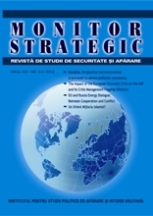Descurajarea. Evoluții conceptuale și formule de implementare
Deterrence. Doctrinal evolutions and implementation frameworks
Author(s): Dragoş ILINCASubject(s): International relations/trade, Security and defense, Military policy, Peace and Conflict Studies
Published by: Editura Militară
Keywords: NATO; deterrence and defence; enhanced Forward Presence; tailored Forward Presence; massive retaliation; flexible response; NATO Strategic Concept; collective defence;
Summary/Abstract: Deterrence is one of the most perennial concept in human history being conventionally associated with the capacity of a given actor to dissuade another actor from embarking into an aggressive action based on demonstrative potential to react decisively. This is only one of the existing definitions of the deterrence which is in fact the constant ingredient of every decision-making process. Deterrence become the main norm for generating efficient strategies with practical applicability developed in the aftermath of Second World War. Since then deterrence theory developed significantly, most often in support of the strategic decisions adopted during Cold War. In this framework, it represented the central recourse of supporting the stability of international system based on a mix of conventional and nuclear capabilities. The end of Cold War brought a new reality in which risks and challenges are more interconnected, thus, requiring more synergetic and multidisciplinary approaches in designing the right framework for deterrence. The most common area for implementing deterrence is defence being extensively tested in the last decade, especially within the framework of NATO. But this is only one perspective from which deterrence could be perceived. Nowadays deterrence is common to various areas in our societies, becoming one of the main instruments in tackling the contemporary asymmetry. Ensuring the right formulas for having a comprehensive deterrence is a continuous process which has to be correlated with the undertaking of creating resilient societies. The necessary solutions could not be identified without implementing flexible approach and structuring practical cooperation formulas which can maximize the support for deterrence strategies.
Journal: Monitor Strategic
- Issue Year: 2021
- Issue No: 1-2
- Page Range: 39-55
- Page Count: 17
- Language: Romanian

